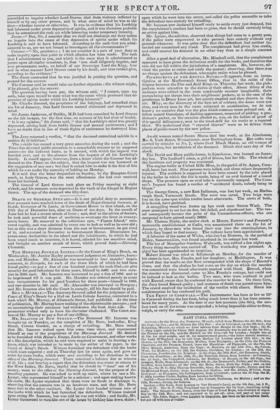THE MORNING Jo unsrar. LIBEL s.—In the Court of King's
Bench, on Wednesday, Mr. Justice Bayley pronounced judgment on Alexander, Isaac- son, and Marsden. Mr. Alexander was sentenced to four months' impri- sonment, in Neivgate, for each of the three libels of which he had been found guilty—to pay a fine of one hundred pounds for each libel—to give security for good behaviour for three years, himself in 500/. and two sure- ties in 250/. each. Mr. Isaacson was sentenced to pay a fine of 100/. and to be imprisoned till it was paid. Mr. Marsden was ordered merely to enter into recognizances for his good tcondact for three years—himself in 100/. and two sureties in 50/. each. Mr. Alexander was conveyed to Netvgate ; and Mr. Isaacson also left the Court in custedy, till his fine should be paid.
REX v. M trims-sr.—The Attorney-General called for the judgment of the Court of King's Bench for a libel on Lewis Celeste Lescene, contained in a book which Mr. Murray, of Albemarle Street, had published. At the time of publication, Mr. Murray knew nothing of the objectionable passages ; and on ascertaining their existence had withdrawn the book from sale. The prosecutor wished only to have his character vindicated. The Court sen- tenced Mr. Murray to pay a fine of one shilling.
Mn. Isnacsos AT Bow STREET.—The Reverend Mr. Isaacson was brought up on Tuesday, on the complaint of Mr. Burn, bookseller, King Street, Covent Garden, on a charge of swindling. Mr. Burn stated that Mr. Isaacson waited upon him some time since, and represented himself as one of the proprietors of the Morning Journal. He desired to be furnished with Humes Essays, Locke on Government, and other works of a like description, which he said were required to assist in framing a de- fence, which was intended to be made by the editor of the paper, in the Court of King's Bench. Witness furnished the defendant with the books which were required ; and on Thursday last he came again, and gave an order for more books, which were sent according to his directions to the office of the Morning Journal. There remained a balance due to witness of 2/. 12s.; and hearing a report that the defendant was about to return to the West Indies, Mr. Burn, fearful that he should be "(lone" out of his money, went to the office of the Morning Journal, for the purpose of de- manding payment. He was asked to walk up stairs, where he saw a Mr. Lyster, who represented himself to be a solicitor ; and upon making known his claim, Mr. Lyster regretted that there were no funds to discharge it, observing that the concern was in an insolvent state, and that Mr. Burn must fare as the other creditors. Mr. Lyster then handed witness two of the books with which he had famished the defendant. Witness insisted upon seeing Mr. Isaacson, but was told he was not within ; and finally, Mr. Lyster threatened to turn him out of the house by kicking him down stairs ; upon which he went into the street, and called the police constable to take the defendant into custody for swindling.
Mr. Isaacson now declared himself ready to settle every just demand, but the complainant's conduct had been so gross, that he should certainly bring an action against him. Mr. Lyster, the solicitor, observed that things had come to a pretty pass, if the police were empowered to take persons into custody without any grounds whatever. It was quite clear that the defendant had neither in- tended nor committed any fraud. The complainant had given him credit, and could recover his demand in no other way than as a simple contract debt.
After a good deal of altercation Mr. Minshull said, that the complainant appeared to have given the defendant credit for the books, and therefore the case did not fall within the jurisdiction of a magistrate. He, however, ad- vised the parties to retire and settle the matter; observing, that there,was no charge against the defendant, who might retire when he pleased. PICKPOCKETS AT THE ARGYLL Roosts.—It appears, from an inves- tigation at the Marlborough Street Office, that in the midst of the dispute between the Fire and Acid Kings on Thursday last week, the pick- pockets were attentive to the duties of their office. About thirty of the audience were robbed in the most comfortable mailer imaginable, their purses being not thrust into their neighbours' pockets, as in the case of the gentleman in Drury Lane pit, but quietly emptied and then thrown in the air. Why, On the discovery of the first act of robbery, the doors were not shut, and every man in the room subjected to examination, we do not know; we conceive that was the plan which common sense pointed out. A fellow named Gascoigne, of dashing appearance, suspected of picking a gen- tleman's pocket, on the occasion alluded to, was, on the failure of proof of this special delinquency, sent to the tread-mill for six weeks as a reputed thief. We understood that "reputed thieves" were to be driven from places of public resort by the new police.


















 Previous page
Previous page